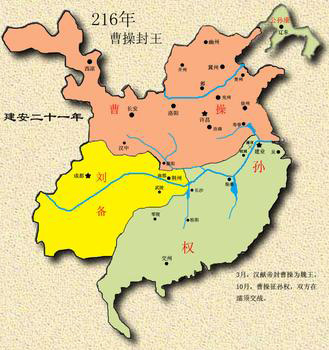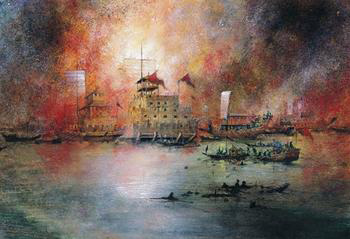
The Tripartite confrontation of the Three Kingdoms is a period in the history of China, that is, the Three Kingdoms Period. In the late Eastern Han Dynasty, the States of Wei, Shu and Wu were established one after another, forming a situation in which the three kingdoms co-existed and confronted with one another, thus the tripartite confrontation. In a strict sense it refers to the period between the foundation of the Wei in 220 and the overthrow of Wei by the Jin Dynasty in 265.
The tripartite confrontation was formed in the 20s of the 2nd century. In 220, Cao Cao’s son Cao Pi deposed Emperor Xian and ended the Han Dynasty. He named his state Wei and enthroned himself at Luoyang. Wei is also known as Cao Wei. In 221, Liu Bei established the Shu Han kingdom, in a bid to restore the fallen Han dynasty. (His state is known as "Shu" or "Shu-Han".) In the same year, Sun Quan established the Wu state. The regime of Wei started the Three Kingdoms Period.

The tripartite confrontation causes great turmoil for battles occurred among the three kingdoms frequently. In 221, Liu Bei declared war on Wu and was disastrously defeated and forced to retreat to Baidicheng, where he died soon afterward. After his death, Zhuge Liang, the prime minister of Shu, sent northern expeditions against Cao Wei, but failed at last and exhausted the national power. In 263, Sima Zhao, commander of Wei, led troops conquering Shu. In 265, Sima Yan, Sima Zhao’s son, usurped the regime of Wei and founded the Jin Dynasty. The destruction of Wei ended the tripartite confrontation. In 280, the conquest of Wu by Jin signaled short reunification of China.
This period also saw economic rehabilitation. At the same time, the economic development boosted up cultural prosperity. Poets and writers like Cao Cao, Cao Pi, Cao Zhi, Kong Rong, Wang Can, Chen Lin, Xu Gan, Ruan Yu, and Liu Zhen formed a vigorous style named Chien-an Style after the reign title of emperor Xian of the Han Dynasty.
Editor:JinXin





Why not rent a boyfriend, or girlfriend to please parents during the Spring Festival?